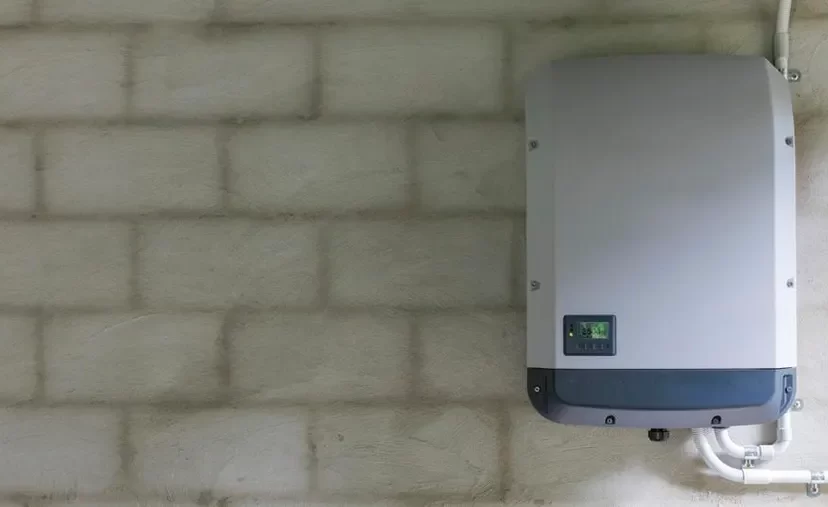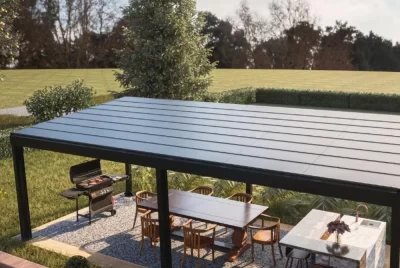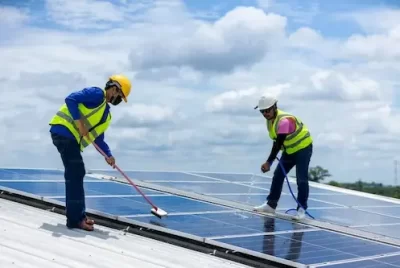Solar Inverters for Homes: Features and Considerations for Installation
We may earn a commission for purchases made using our links. See our disclosure to learn more.
Harnessing the power of the sun requires an efficient conversion of sunlight into usable electricity. Solar inverters play a vital role in this process by converting the direct current (DC) generated by solar panels into alternating current (AC) that can be used to power appliances and devices in your home. In this article “Solar Inverters for Homes”, I will guide you through the features and considerations to keep in mind when choosing and installing a solar inverter for your home.
Understanding Solar Inverters for Homes
What is a Solar Inverter?
A solar inverter for homes is an electronic device that converts the DC electricity produced by solar panels into AC electricity. It acts as the heart of a solar power system, ensuring that the energy generated by the panels can be used to power your home or fed back into the grid.
Types of Solar Inverters
There are primarily two types of solar inverters commonly used in residential installations: string inverters and microinverters. String inverters are connected to multiple solar panels, whereas microinverters are installed on each individual panel.
How Solar Inverters Work
Solar inverters work by using power electronics to convert the variable DC voltage from the solar panels into a stable AC voltage suitable for household use. They also provide important safety functions, such as disconnecting from the grid during power outages to prevent back feeding.
Features to Consider Regarding Solar Inverters for Homes
When selecting a solar inverter for your home, it is essential to consider several key features that will ensure optimal performance and reliability. Here are some crucial factors to keep in mind:
Efficiency
Choosing an inverter with high efficiency ensures that a minimal amount of solar energy is wasted during the conversion process. Look for inverters with high peak efficiency ratings, as they will maximize the electricity generated by your solar panels.
Power Rating
The power rating of the inverter should match the capacity of your solar panels. Select an inverter with a power rating that can handle the maximum output of your solar array to avoid any performance limitations.
Durability and Warranty
Investing in a durable solar inverter is crucial for long-term performance and reliability. Look for inverters with a solid build quality and a warranty that provides adequate coverage. A longer warranty period is generally indicative of a manufacturer’s confidence in the product’s durability.
Monitoring and Control
Opting for a solar inverter with advanced monitoring and control capabilities allows you to track the performance of your solar power system. Look for features such as real-time monitoring, data logging, and remote access to ensure you can easily monitor and manage your system’s efficiency.
Safety Features
Safety should always be a priority when selecting a solar inverter. Look for inverters with built-in protection mechanisms, such as overload protection, short-circuit protection, and ground fault detection. These features help safeguard your system and prevent any potential hazards.
String Inverters vs. Microinverters
Pros and Cons of String Inverters
String inverters are a popular choice for residential solar installations due to their cost-effectiveness and ease of installation. They are connected to multiple solar panels, reducing the overall system complexity. However, string inverters have a limited ability to optimize energy production when panels are affected by shading or mismatched performance.
Pros and Cons of Microinverters
Microinverters, on the other hand, offer advantages in terms of individual panel optimization. Each panel operates independently, maximizing energy production even in partially shaded conditions. However, the higher cost per panel and more complex installation process can be potential drawbacks.
Which Type Is Suitable for Your Home?
The choice between string inverters and microinverters depends on various factors, such as the size and configuration of your solar array, shading issues, and budget considerations. Consulting with a solar professional can help determine the most suitable option for your specific needs.
Hybrid Solar Inverters
Benefits of Hybrid Inverters
Hybrid solar inverters are a versatile option that combines the functionality of a solar inverter with an energy storage system. These inverters allow you to store excess solar energy in batteries for later use, maximizing self-consumption and providing backup power during outages.
Integration with Energy Storage Systems
Hybrid inverters seamlessly integrate with energy storage systems, enabling you to optimize the use of solar energy throughout the day. With battery storage, you can store surplus energy generated during the day and use it during peak demand periods or at night when solar production is limited.
Energy Management and Grid Connectivity
Hybrid inverters often come with advanced energy management features, allowing you to prioritize energy usage, set charging and discharging schedules, and even participate in grid-tied programs such as net metering. These features provide greater control over your energy consumption and grid connectivity.
Sizing and Installation Considerations Regarding Solar Inverters for Homes
Solar Panel Configuration
When installing a solar inverter, it is essential to ensure compatibility with the solar panel configuration. Consider factors such as the number of panels, their orientation, and the wiring setup to determine the appropriate inverter size and type.
Electrical Compatibility
Verify that the solar inverter you choose is compatible with your home’s electrical system. Consider factors such as voltage requirements, phase compatibility, and the capacity of your electrical service to ensure seamless integration and safe operation.
Placement and Ventilation
Proper placement of the solar inverter is crucial for efficient operation and longevity. Install the inverter in a well-ventilated area away from direct sunlight and excessive heat. Adequate airflow around the inverter helps dissipate heat and prolong its lifespan.
Maximizing Solar Inverter Efficiency Regarding Solar Inverters for Homes
Proper Maintenance and Cleaning
Regular maintenance and cleaning of your solar inverter contribute to its long-term efficiency. Keep the inverter and its surroundings clean and free from dust or debris. Follow manufacturer guidelines for maintenance intervals and procedures.
Shading and Obstruction Prevention
Ensure that your solar panels are not shaded by trees or nearby structures as shading can significantly impact the performance of your solar inverter. Regularly trim trees or remove any obstructions that cast shadows on the panels to maximize sunlight exposure and energy production.
Regular Monitoring and Upgrades
Monitor the performance of your solar inverter regularly to identify any potential issues or inefficiencies. Some inverters come with software or online platforms that provide real-time data and alerts. Additionally, consider firmware updates or upgrades recommended by the manufacturer to enhance the functionality and efficiency of your inverter.
Conclusion
Choosing the right solar inverter for homes is a crucial decision when transitioning to solar energy. Consider the features and factors discussed in this article to ensure optimal performance, efficiency, and reliability. Consulting with a solar professional can provide further guidance and help tailor the selection and installation process to your specific requirements.
Check out Solar Inverters on Amazon.
FAQs (Frequently Asked Questions)
1. How long do solar inverters typically last?
Solar inverters have an average lifespan of 10 to 15 years. However, high-quality inverters with proper maintenance can last even longer.
2. Can I install a solar inverter myself, or should I hire a professional?
It is recommended to hire a professional for the installation of a solar inverter. They have the expertise to ensure proper wiring, electrical compatibility, and adherence to safety standards.
3. What is the difference between on-grid and off-grid inverters?
On-grid inverters are designed to feed excess solar energy back into the grid, while off-grid inverters are used in standalone systems that are not connected to the utility grid.
4. Can I upgrade my existing solar inverter?
In some cases, it may be possible to upgrade your solar inverter to a more advanced model. However, compatibility and system requirements should be assessed by a professional before considering an upgrade.
5. Are solar inverters noisy?
No, solar inverters operate quietly and do not produce significant noise during their normal operation.
Remember, choosing the right solar inverter and ensuring proper installation is essential for maximizing the benefits of your solar power system. By considering the features and factors discussed in this article, you can make an informed decision and enjoy clean, renewable energy for years to come.




